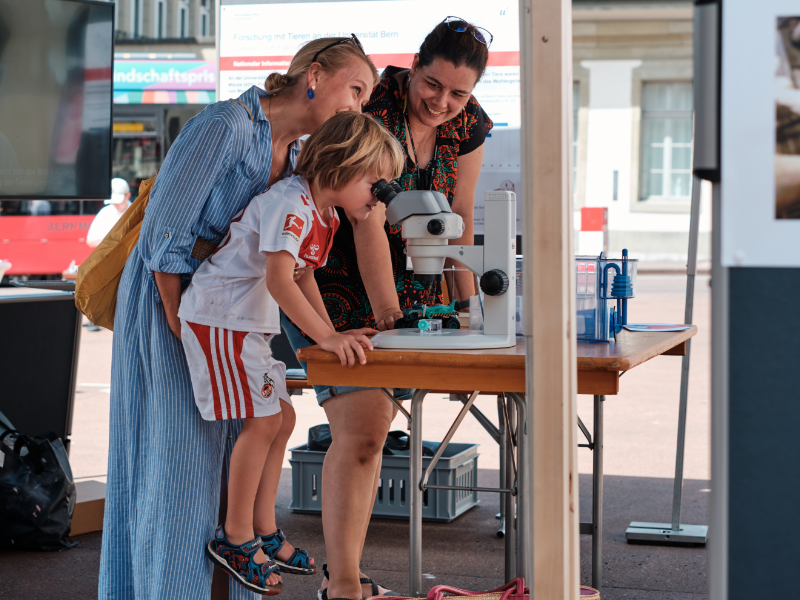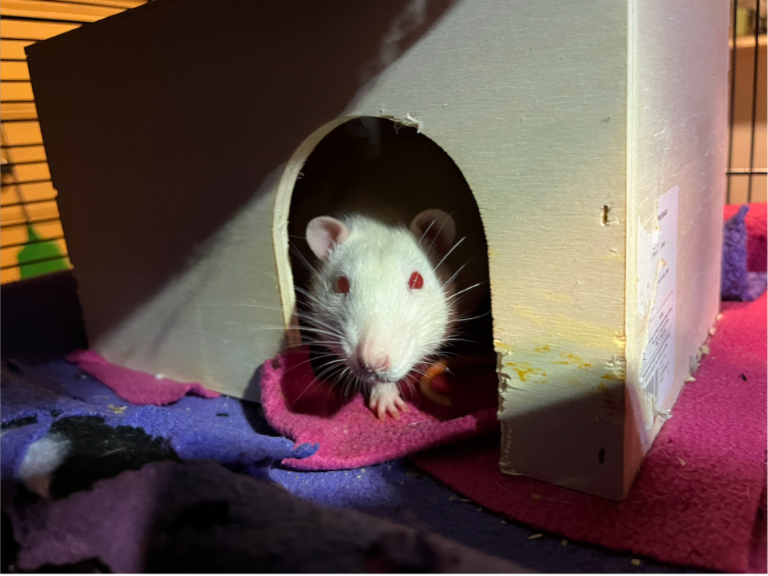Animal Research
In Dialogue About Animal Research
At the National Information Day of the Experimental Animal, researchers from the University of Bern presented their work involving animal experimentation at a booth on Casinoplatz Bern and offered interested visitors first-hand information.

For the second time, researchers of he University of Bern took part in the National Information Day of the Experimental Animal: on Saturday, June 14, eleven researchers presented posters, flyers, cages, and videos at a booth on Casinoplatz and engaged in conversations with passers-by. The event was organized by the Animal Welfare Office of the University of Bern with support from the Communication and Marketing Office.

Visitors were invited to stop by for a coffee, although due to the heat, water was more in demand.

Projects from both veterinary and human medicine were presented. Some visitors stayed for extended conversations at the booth, showing interest not just in specific projects but in the broader topic. Numerous misconceptions about animal research at the University of Bern could be clarified, such as the false belief that experiments are conducted there for cosmetics testing.

A particular favorite among children was the stereoscope, which allowed them to see the beating heart of transparent zebrafish embryos. Zebrafish are used as an animal model to better understand how injured hearts can regenerate, to develop new medications, and to gain deeper insights into cancer.

The feedback was largely positive, even from critical individuals. It was considered important that the researchers from the University of Bern “go out to the public,” show interest in dialogue, aim to inform rather than persuade, and ensure that “people don’t hear only the arguments of the opponents.”
Animal research at the University of Bern
Animal research is essential for medical progress and, consequently, for the health of both humans and animals. Many research projects in Bern directly contribute to improving animal welfare. The University of Bern has facilities, processes, and control mechanisms in place to ensure that researchers optimize their experiments to minimize stress on the animals and that animal experiments are only carried out when no alternatives are available. The University of Bern conducts top-level research responsibly and with respect for both animals and people. It is a leader in animal welfare research and actively promotes and develops alternative testing methods.
National Information Day
The National Information Day of the Experimental Animal (NIDEA), introduced in 2022, aims to provide passers-by with first-hand information about animal testing and to answer their questions. The event is organized by the association “Research for Life” in cooperation with the Swiss Society for Laboratory Animal Science (SGV) and the Swiss Association of Veterinarians in Industry and Research (SAVIR). The University of Bern has participated in the event since 2023. This year, for the first time, the universities of Basel and Zurich as well as ETH Zurich also took part.
Subscribe to the uniAKTUELL newsletter

Discover stories about the research at the University of Bern and the people behind it.


